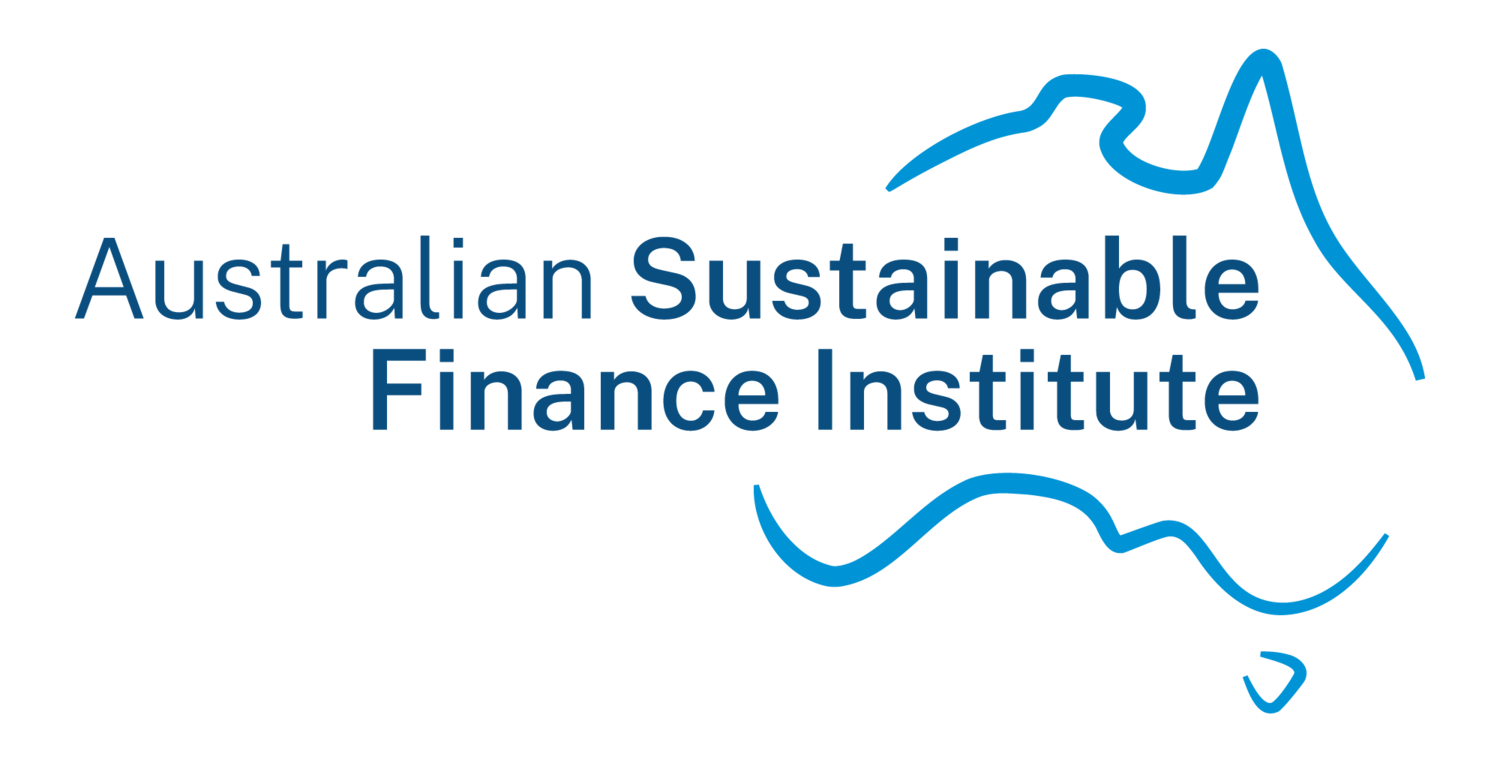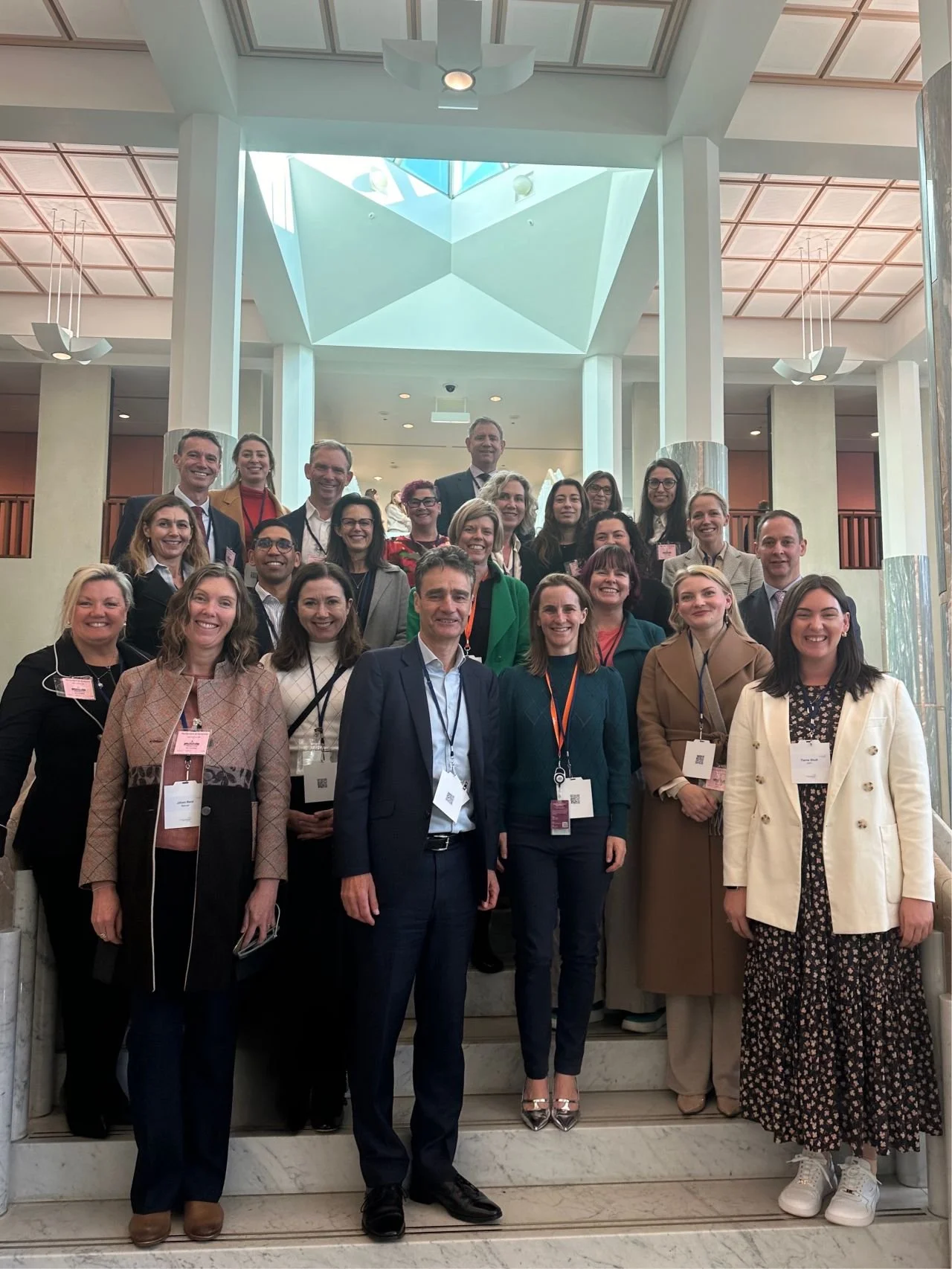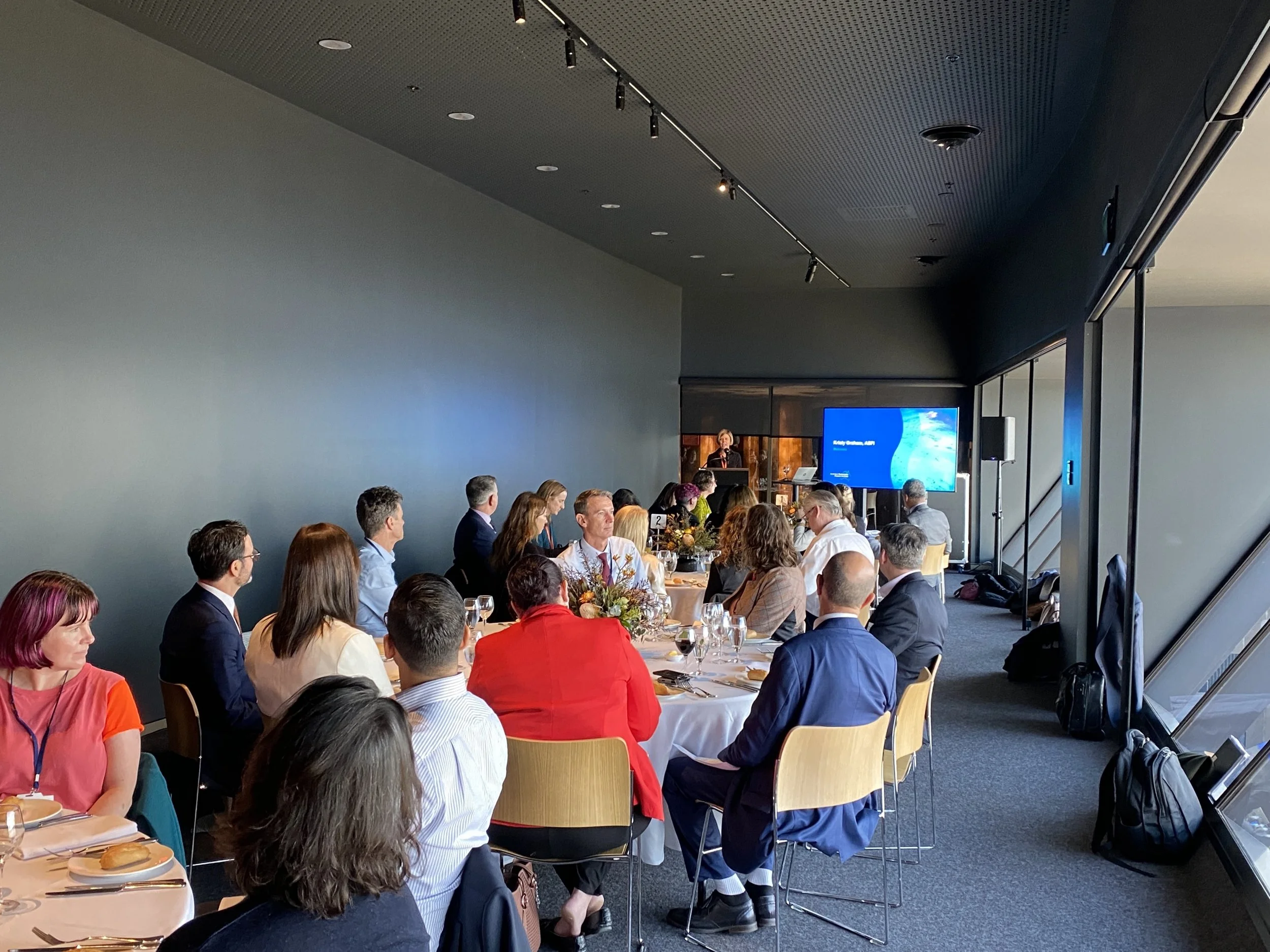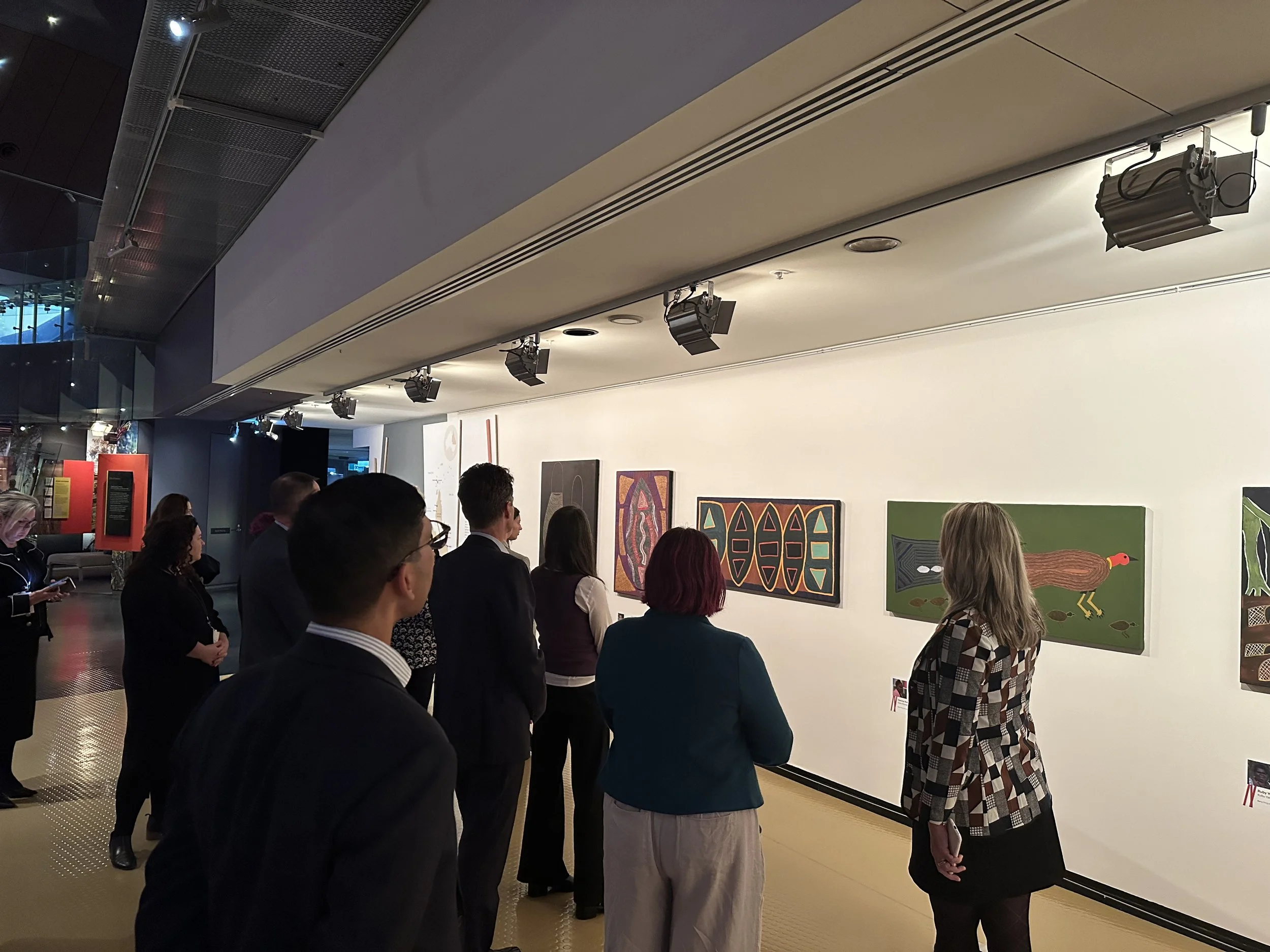Insights and Reflections from ASFI's 2024 Member Visit to Canberra
ASFI member representatives at Parliament House.
ASFI members came together on Ngunnawal and Ngambri Country this week, braving the Canberra cold for a full program of meetings with Ministers, Parliamentarians and Senior Officials on sustainable finance. Read our highlights below.
Roundtable with Assistant Minister for Climate Change and Energy
Members met with the Assistant Minister for Climate Change and Energy, Senator Jenny McAllister, to discuss the policy agenda across both climate mitigation and adaptation. The Assistant Minister welcomed the finance sector’s support for Australia’s climate transition and noted the value of finance sector engagement with Government to help develop policy solutions that enable private capital.
ASFI members underscored the importance of Australia having an ambitious and science-based 2035 Nationally Determined Contribution (NDC) and aligned sector decarbonisation plans to unlock finance. Policy certainty and consistency was key to financial institutions’ broader strategies as well investor confidence. Discussions also touched on opportunities to support residential electrification (for example through development of a national energy ratings framework for residential buildings), and to increase flows of finance towards adaptation and resilience at both the national and individual homeowner levels.
Members raised existing regulatory barriers to progress on sustainable finance, including competition law, which the Assistant Minister undertook to discuss further.
Roundtable with crossbench MPs on how to unlock private finance for climate
ASFI CEO, Kristy Graham engaging with crossbench MPs
Together with the Investor Group on Climate Change (IGCC), ASFI members met with several crossbench MPs, including Zali Steggall, Allegra Spender, Kylea Tink, Sophie Scamps, Kate Chaney and Helen Haines. Discussions covered the need for greater investment in adaptation and resilience, Australia’s decarbonisation agenda, and First Nations participation in the climate transition.
On adaptation and resilience, members welcomed existing Government action including the first pass National Climate Risk Assessment and Disaster Recovery Fund, but noted there was significant underinvestment in building resilience across infrastructure, communities and the economy. Expanding the scope of the sustainable finance taxonomy would help to channel flows of private finance towards adaptation and resilience measures. Zali Steggall flagged she was developing a private Member’s bill on climate risk and welcomed further engagement with the sector on this.
On the broader transition, ASFI expressed concern about recent positioning from the Coalition on Australia’s Paris Agreement commitments, and members noted the role an ambitious 2035 NDC could play in sending positive signals to the market about Australia’s mid-term climate policy. The Government’s Future Made in Australia (FMA) vision had potential to unlock capital towards the transition. The Australian taxonomy could be used to establish eligibility criteria for FMA grants, loans and tax credits, helping to align public and private capital around a common definition of ‘green’ and ‘transition’.
Discussions also covered the importance of meaningful participation of First Nations in the transition, and the need to go beyond social license to active participation in major projects by First Nations communities. Options to foster this included: consultation as part of FMA implementation, enabling First Nations communities to secure an equity stake in projects that take place on their lands, support for Traditional Owners to make informed agreements with project proponents, and facilitating access to capital for First Nations businesses.
Luncheon with Senior Officials: Public-private collaboration in Australia’s climate transition
ASFI members and senior government officials participating in a luncheon at the National Museum of Australia
Members participated in a working lunch with senior officials from Treasury and the Net Zero Economy Agency. Alex Heath (First Assistant Secretary, Climate and Energy Division at Treasury) provided an overview of the Government’s Sustainable Finance Roadmap, and noted climate disclosures legislation would be debated in the Senate imminently. She invited engagement from the finance sector on forthcoming consultations on product labelling and transition plan guidance
Roundtable discussions covered barriers to, and opportunities for, public-private coordination in the climate transition. Key themes included:
The need to streamline approvals and funding mechanisms.
Opportunity for APRA capital rules to better reflect climate-related risk and encourage flow of capital for green and transition activities.
The importance of calibrating Government investment under FMA (e.g. through Specialist Investment Vehicles such as EFA and NAIFF EFA) to crowd-in private capital through equity and other de-risking approaches.
Opportunities to build demand for nature and carbon markets.
Intersectionality of issues across sectors.
Discussions also explored ways for both Government and the finance sector to ensure meaningful First Nations participation in the transition. Key themes included:
Capability building for Government and private sector to engage with First Nations communities.
Technical support for First Nations communities (including Traditional Owners) to make decisions regarding their land.
Requirements around consultation and engagement, for example as part of investment processes and corporate disclosures.
Integration of FPIC principles in Government policies and programs developing First Nations disclosures, and capability building.
Models for joint ownership of projects.
ASFI Member Working Session: First Nations and Finance
ASFI members attending a guided tour of the National Museum’s Belonging exhibition
Building on the working lunch and following a guided tour of the National Museum’s Belonging exhibition, ASFI’s First Nations and Finance Lead, Tiarne Shutt, led an interactive working session for members on the role of financial institutions in supporting the economic self-determination objectives of First Nations communities.
The session used the South West Native Title settlement – the largest native title settlement in Australian history – as a case study to unpack systemic barriers to First Nations communities accessing capital. Discussions touched on the need to ensure greater First Nations representation in bodies and mechanisms with responsibility for making decisions impacting upon them, alternative financing vehicles to unlock capital for First Nations businesses, and what ‘good’ might look like in terms of proper community consultation and engagement. Thank you to Rebecca Blurton (First Nations Affairs), for providing the content and inspiration behind this session.
We look forward to further engagement with ASFI members on these questions as part of our First Nations and Finance work program.
Panel and Networking Event: Financing climate adaptation and resilience
To close out the day, members attended a panel discussion and networking event at Parliament House, hosted by the Investor Group on Climate Change (IGCC) and Parliamentary Friends of Clean Investment (co-chaired by Senators Andrew Bragg, Karen Grogan and David Pocock).
The event was also attended by crossbench MPs Monique Ryan and Kate Chaney, and Labor MP Zaneta Mascarenhas, and featured presentations from ANU, Queensland Investment Corporation and the Resilient Building Council.
Key themes from the event included: the need to increase levels of public and private investment in adaptation and resilience in order to protect people and assets from physical climate risks, the benefits of investing now to reduce disaster recovery costs and avoid capital flight, and role of enabling policy settings such as mandatory climate disclosures.
Thank you to all member representatives who joined us on the day. We know that Parliamentarians value your views and perspectives, and we look forward to building on the day’s interactions as we continue to work closely with our members, government and the broader finance sector to accelerate the sustainable finance policy agenda in Australia.




